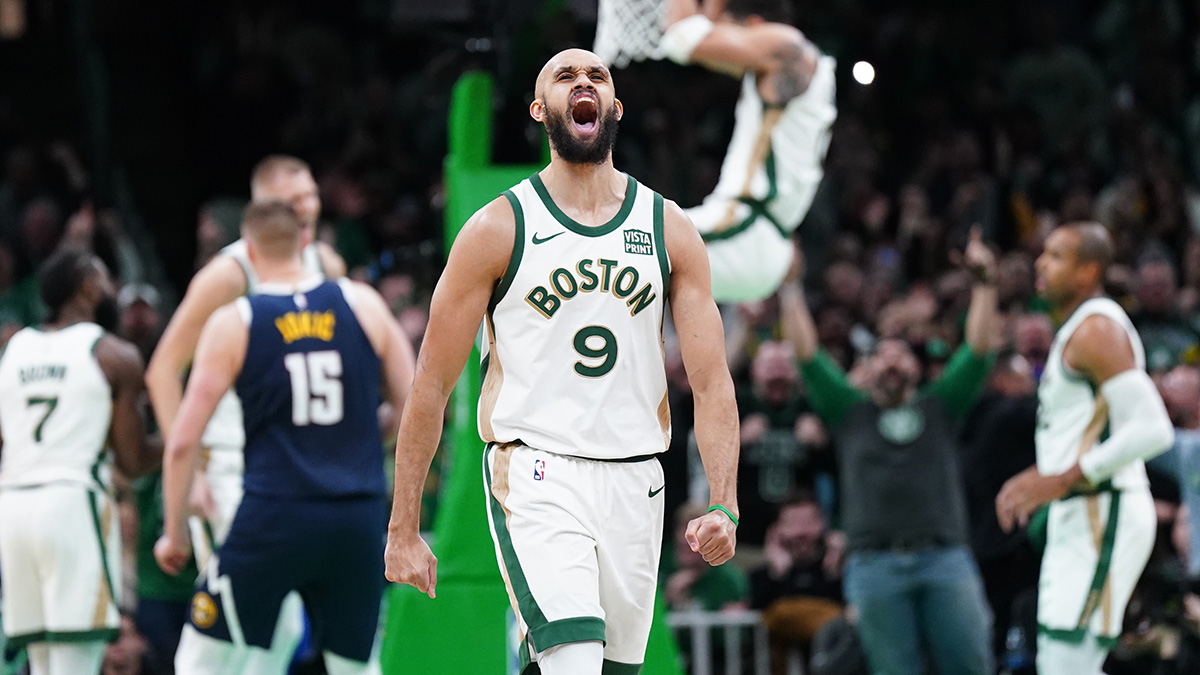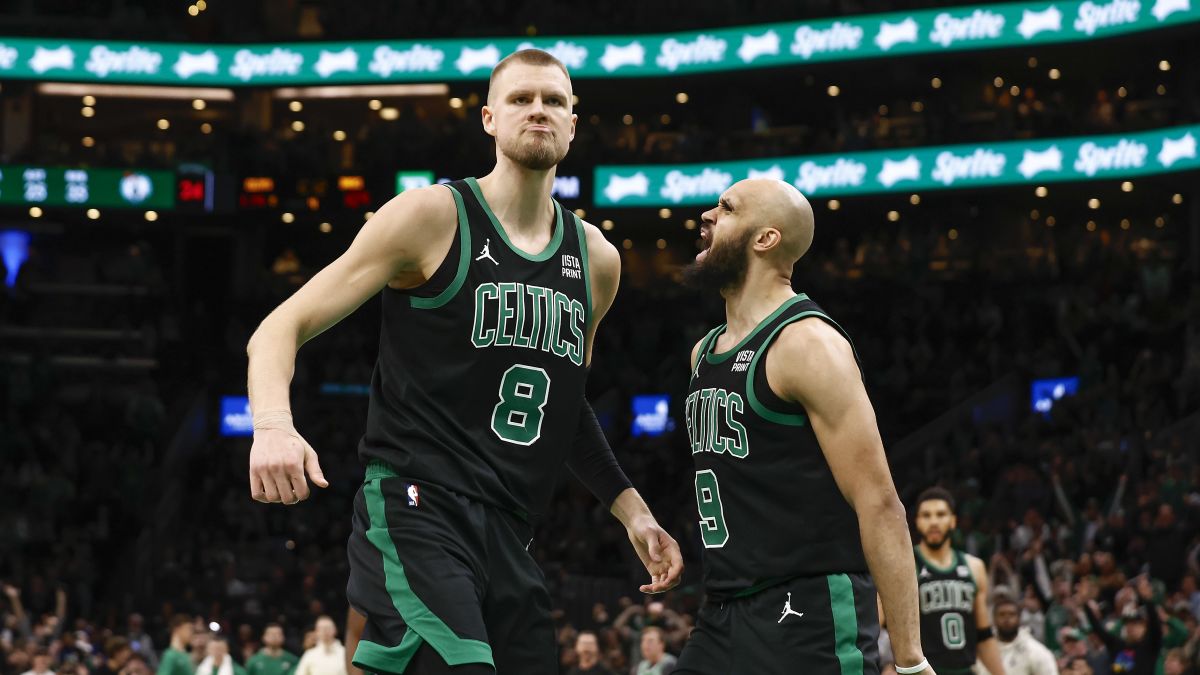If the 2019-20 Boston Celtics have an obvious flaw it is that they often lack a killer instinct.
Boston has a propensity to build big leads only to allow an opponent right back into the game. More concerning is that, when games are in the balance, the Celtics too often wilt against quality opponents while abandoning the hallmarks of what put them in position to win in the first place.
The Celtics are 5-4 this postseason in games that trigger the league’s crunch-time criteria with the score within five points during the final five minutes. But three of those wins came during a first-round sweep of the head-slapping Sixers. Starting with OG Anunoby’s miracle 3-pointer in Game 3 of the East semifinals, the Celtics have lost four of their last five crunch-time games, including a pair of overtime heartbreakers.
Stay in the game with the latest updates on your beloved Boston sports teams! Sign up here for our All Access Daily newsletter.
Forsberg: Celtics need a better Kemba to beat Heat
Sure, you have to tip your cap to opponents in instances like Anunoby’s improbable make. During Tuesday night’s Game 1 of the Eastern Conference finals, Heat All-Star center Bam Adebayo made an insane defensive play to deny Jayson Tatum at the rim at the end of overtime.
But it was Boston’s pathetic offensive execution and multiple defensive breakdowns late in the game that left the Celtics vulnerable to that sort of late-game heroics. Or, as Daniel Theis more succinctly stated regarding Boston’s late-game woes, “We played really bad, really terribly.”
Stevens harped on Boston’s lackluster transition defense and understandably so. The image of Tyler Herro burying a quick 3 after Kemba Walker put the Celtics up 5 with 69 seconds to play in regulation was the perfect example of Boston being a step slow and making their lives far more difficult. But Stevens acknowledged, too, that much of Boston’s defensive woes might have been born out of it’s isolation-heavy offense.
Boston Celtics
“We have to all do a better job of moving the ball and getting to where we want to go. We talked a lot about that [during Wednesday’s film session],” said Stevens. "There’s no question that, the last two games especially, our offense has been way too stagnant at the end of the game. That’s contributed to some of our transition defense [troubles] — you’re not going to be quite as engaged when we’re all staring."
Boston’s defense has typically been solid in crunch time, the team posting a stellar 93.8 defensive rating over 43 minutes of crunch-time play. But it’s the offense that has really hindered the Celtics. Boston’s pace plummets in crunch time and they too often settle for clock-sucking isolation possessions instead of the ball-movement-fueled offense that typically generates their best possessions.
In Game 1 against Miami, Boston often looked like it was trying to kneel out the clock. The Celtics’ crunch-time offensive rating was 88.9. Over the 9.5 minutes that met the criteria, Boston shooters made only 5 of 17 shots, got blocked three times, and misfired on all six 3-pointers attempted. Too frequently, the Celtics simply put the ball in the hands of Tatum or Walker and asked them to produce something in isolation while teammates stared in their direction.
The Celtics need to work harder for better shots. Walker, mired in a nasty shooting slump, nearly bailed the team out a couple times, only to have defensive lapses on the other end of the floor that allowed Miami to rally back out front each time.
The Celtics didn’t get Jaylen Brown enough opportunities late in Tuesday's game either. He had only 41 touches in 44 minutes of floor time. As a backup point guard, Brad Wanamaker surely has the ball in his hands often, but even he had 62 touches in just 25 minutes of court time. Walker (112) and Tatum (101) accounted for nearly 47 percent of Boston’s total touches in the game.
Celtics Talk Podcast: Kemba struggles, Bam’s block, and how did the Heat steal Game 1 from the Celtics? | Listen & subscribe | Watch on YouTube
"We got stagnant. We rested and we got complacent, and against a team like this, you can’t get complacent,” said Smart.
Echoed Tatum: “We have to be more consistent and do what got us the lead. We shied away from that a little bit and allowed them to get back into the game.”
Boston simply has to be better and not get overwhelmed by the magnitude of the moment. The Celtics rarely had to play from behind over the first six games of the postseason. During the past five crunch-time games, they’ve lacked the discipline and composure to generate good offensive possessions.
Take away Daniel Theis' 9-of-11 shooting over those fives games (he was an alley-oop fiend in the double overtime loss to Toronto) and the rest of the team has really struggled to consistently hit crunch-time shots, especially 3-point looks.
CELTICS IN CRUNCH TIME IN THEIR LAST 5 GAMES
| Player | PTS | FGM-FGA | 3PM-3PA | TO | Plus/Minus |
| Daniel Theis | 18 | 9-11 | 0-1 | 0 | -6 |
| Jayson Tatum | 13 | 4-17 | 1-8 | 4 | -8 |
| Kemba Walker | 12 | 4-9 | 0-2 | 0 | -2 |
| Jaylen Brown | 10 | 4-12 | 0-1 | 0 | -8 |
| Marcus Smart | 3 | 1-4 | 1-3 | 1 | -8 |
| Grant Williams | 0 | 0-1 | 0-1 | 0 | -2 |
| Totals | 56 | 22-54 | 2-16 | 5 |
It’s on Stevens, too, to get better shots for his players, especially coming out of timeouts. It’s on his players to trust those calls, keep the ball moving, and not fall into isolation situations.
The numbers for Tatum and Walker in isolation have been an eyesore this postseason. Tatum has scored 44 points on 59 isolation attempts (0.75 points per play) and is shooting just 26.7 percent in that play type, per the NBA’s tracking data. Walker has generated a mere 12 points on 20 isolation plays (0.60 ppp) and is shooting just 28.6 percent.
The Celtics, as a whole, are tied for the worst isolation production in the postseason at 0.66 points per play, according to Synergy Sports tracking. Boston averages only 6.3 isolation points per game while shooting just 33.3 percent overall. Contrast that with their ball-handlers averaging a robust 1.04 points per play in all pick-and-roll situations.
Many of Boston’s lapses on the defensive end are fixable. They need to get back quicker, avoid mental lapses like leaving Butler alone in the corner in crunch time, and making every shot difficult. But they absolutely cannot win without better offensive execution whenever things go sideways.
Whether that’s steadying themselves when Miami first starts chipping away at their double-digit leads (both early in the game, and again in the fourth quarter), or producing a key crunch-time bucket, the Celtics need to operate with better poise. Too often it feels like they’re desperately trying to hold onto a win instead of trying to put the opponent away.
CELTICS OFFENSIVE RATING BY QUARTER THIS POSTSEASON
1st: 114.4; 2nd: 112.3; 3rd: 108.5; 4th: 108.0
"Every time we got up big or a double-digit lead, we stopped playing and started doing things we are not supposed to do,” said Theis. "We have to stay more locked in and focused, especially when we go up 10. We have to have the mindset to go up 20 instead of like relaxing and just like trying to win the game. We got to keep pushing and we got to play our way.”
Echoed Jaylen Brown: "At times, we let go of the rope. We had a pretty good lead and we got away from some of the things that led us to that lead. Just continuing to play basketball the way we want to play basketball is something that we have to continue to make an emphasis, regardless of the score. I feel like we'll get back to playing Celtic basketball.”


